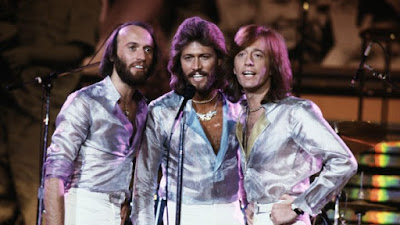Before forming Queen, May and Taylor had played together in the band Smile. Mercury was a fan of Smile and encouraged them to experiment with more elaborate stage and recording techniques. He joined in 1970 and suggested the name "Queen". Deacon was recruited in February 1971, before the band released their eponymous debut album in 1973. Queen first charted in the UK with their second album, Queen II, in 1974. Sheer Heart Attack later that year and A Night at the Opera in 1975 brought them international success. The latter featured "Bohemian Rhapsody", which stayed at number one in the UK for nine weeks and helped popularise the music video format.
The band's 1977 album News of the World contained "We Will Rock You" and "We Are the Champions", which have become anthems at sporting events. By the early 1980s, Queen were one of the biggest stadium rock bands in the world. "Another One Bites the Dust" from The Game (1980) became their best-selling single, while their 1981 compilation album Greatest Hits is the best-selling album in the UK and is certified nine times platinum in the US. Their performance at the 1985 Live Aid concert is ranked among the greatest in rock history by various publications. In August 1986, Mercury gave his last performance with Queen at Knebworth, England. In 1991, he died of bronchopneumonia—a complication of AIDS—and Deacon retired in 1997. Since 2004, May and Taylor have toured under the "Queen +" name with vocalists Paul Rodgers and Adam Lambert.
Queen have been a global presence in popular culture for more than four decades. Estimates of their record sales range from 170 million to 300 million, making them one of the world's best-selling music artists. In 1990, Queen received the Brit Award for Outstanding Contribution to British Music. They were inducted into the Rock and Roll Hall of Fame in 2001, and with each member having composed hit singles all four were inducted into the Songwriters Hall of Fame in 2003. In 2005 they received the Ivor Novello Award for Outstanding Song Collection from the British Academy of Songwriters, Composers, and Authors, and in 2018 they were presented the Grammy Lifetime Achievement Award.
1968–1971: Foundations
The founder members of Queen met in West London during the late 1960s. Guitarist Brian May had built his own guitar with his father in 1963, and formed the group 1984 the following year with singer Tim Staffell.[1] May left the group in early 1968 to focus on his degree in Physics and Infrared Astronomy at Imperial College and find a group that could write original material.[2] He formed the group Smile with Staffell (now playing bass) and with keyboardist Chris Smith.[3] To complete the line-up, May placed an advertisement on a college notice board for a "Mitch Mitchell/Ginger Baker type" drummer; Roger Taylor, a young dental student, auditioned and got the job.[4] Smith left the group in early 1969, immediately before a gig at the Royal Albert Hall with Free and the Bonzo Dog Doo-Dah Band.[5]
While attending Ealing Art College in west London, Staffell became friends with fellow student Freddie Bulsara, who was from Zanzibar and of Indian Parsi descent.[6][7] Bulsara had studied fashion design for a year before switching to graphic art and design,[8] and soon became a keen fan of Smile. He asked if he could join the group as lead singer, but May felt Staffell would not give up that role.[9] He also ran a stall in Kensington Market with Taylor.[10]
In 1970, Staffell quit Smile, feeling his interests in Soul and R&B clashed with the group's hard rock sound and being fed up with the lack of success. He formed the group Humpy Bong with former Bee Gees drummer Colin Petersen.[11] The remaining members accepted Bulsara as lead singer, and recruited Taylor's friend Mike Grose as bassist. The four played their first gig at a fundraising event in Truro on 27 June 1970.[12] Bulsara suggested the group should be renamed to "Queen". The others were uncertain at first, but he said "it's wonderful, dear, people will love it".[12] At the same time, he decided to change his surname to "Mercury", inspired by the line "Mother Mercury, look what they've done to me" in the song "My Fairy King".[13] The group played their first London gig on 18 July.[14] The early set consisted of material that would later appear on the first two albums, along with various rock and roll covers, such as Cliff Richard and the Shadows' "Please Don't Tease". They attracted the attention of producer John Anthony, who was interested in the group's sound but thought they had the wrong bass player.[13] Grose decided not to continue with the band and was replaced by Barry Mitchell.[15] In turn, Mitchell left in January 1971 and was replaced by Doug Bogie for two gigs.





